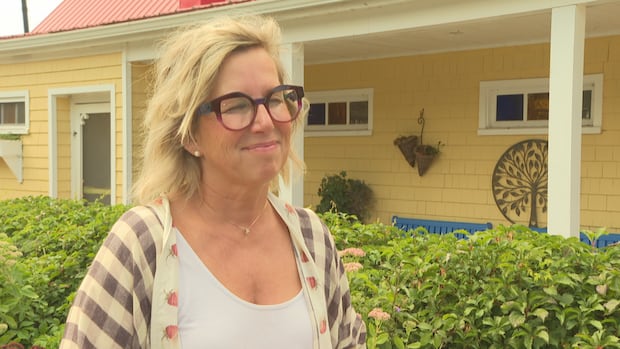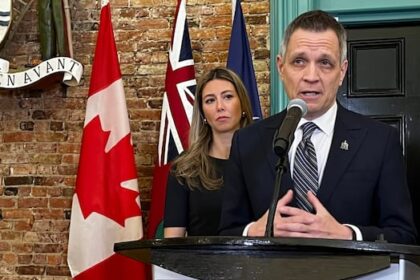PEISome Island businesses are putting a pause on shipments to the United States after duty-free shipments came to an end on Aug. 29.Goods valued under $800 US are now subject to tariff rates based on country of originRyan McKellop · CBC News · Posted: Sep 09, 2025 7:24 PM EDT | Last Updated: 3 hours agoP.E.I. business pauses U.S. shipping following elimination of ‘de minimis’ duty-free shippingSome P.E.I. businesses are putting a pause on shipping to the United States. A rule change has come into effect — and it means there are more charges on some packages. CBC’s Sheehan Desjardins has details. Some Prince Edward Island businesses are pressing pause on shipments to the United States after what are known as de minimis duty-free shipments came to an end on Aug. 29.For decades, Canadian companies have been able to ship items worth less than $800 US to the States without any tariffs, but U.S. President Donald Trump signed an executive order this summer to eliminate that.Now, those shipments are subject to the tariff rates Trump set under his International Emergency Economic Powers Act (IEEPA), which are based on the product’s country of origin.Marsha Doiron, co-owner of the Prince Edward Island Preserve Company, said the change has led the New Glasgow business to pause all U.S.-bound shipments.”There’s been a little bit of red tape around our U.S. shipping right now, so we put a pause on it. There’s a lot of unforeseen fees that are being added to the customer.”Not only is there a duty charged to ship into the United States, she said, but there is also an administration fee from the courier — and they don’t know what that is until it gets to the customer.Marsha Doiron, co-owner of the Prince Edward Island Preserve Company, says part of their business model involves shipping products to tourists, often from the United States. (Sheehan Desjardins/CBC)The P.E.I. Preserve Company has been operating for decades, selling a variety of products including preserved fruit spreads and other food items. The New Glasgow headquarters is a popular destination for tourists, and Doiron said they can buy the products on site but don’t have to tote them all the way back home.”We get a lot of American tourists here and part of our claim to fame is they can ship it home,” she said. “We’re not even telling anybody about that right now, because we don’t want to disappoint people when they get their parcel.”Doiron said parcels that have been sent out recently have been rejected, have come with a demand for duty to be paid, or are not reaching the customer at all. If I was that guest expecting my jams to arrive and I’m…getting dinged with another $50 US, I don’t know if I’d accept it.— Marsha Doiron”If I was that guest expecting my jams to arrive and I’m… getting dinged with another $50 US, I don’t know if I’d accept it,” she said. “I mean, we make really good preserves, but I don’t know what I would do either.”Doiron said this is a “big deal” for the business.”As business operators, we’re known for being innovative. But this one — I think we’re just pausing, like we said. And how do we navigate? Where do we go next?”Major impact on micro businessDoiron isn’t alone in facing this issue. Frédéric Gionet, director of legislative affairs in the Atlantic region for the Canadian Federation of Independent Business, said this will impact a lot of the micro businesses that have sprouted up across North America.Frédéric Gionet, director of legislative affairs in the Atlantic region for the Canadian Federation of Independent Business, is calling on the federal government to reduce the small business tax rate to help during this time. (Zoom)Gionet said they include people who make T-shirts, crafts or souvenirs and ship them to tourists who have visited the Island. Many of these micro businesses rely on low shipping costs. “A lot of businesses have been, you know, either buying goods from, [or] importing goods from China, transforming them, crafting them and selling them back directly to consumers,” he said.”If you look at Etsy, if you look at a lot of these smaller companies… they depend on having, you know, very inexpensive ways to ship their products, import products and ship back, transform products back directly to their consumers.”Gionet said he is not surprised that some Island companies are choosing to pause shipments to the U.S. He said the CFIB offers a guide of the trade rules in place, as well as guidelines to make sure products are compliant with the Canada-U.S.-Mexico Agreement. ‘Government needs to play a…role’If these rules stay in place, Gionet said, it could limit the creation of more micro businesses and other startups. He said he hopes the government can step in and provide some help to those affected.”Government needs to play a certain role to support that,” he said.”We’ve seen the tariff response announcement from Prime Minister Mark Carney. That helps, but also raises a lot of questions as far [as], you know, ‘Can we go another round of the [Canada Emergency Business Account (CEBA) loans]… where we’re just going to burden small businesses with more debt?’ So that’s going to be a careful balance to deal with.”Gionet said he is calling on government to lower small business tax rates.”We’re calling on the federal government to do exactly what the provincial P.E.I. government did and reduce the small business tax rate at the federal level, little things like that,” he said.”They can just reduce the burden of all these additional costs and additional complications, just to give some oxygen into the tank.”ABOUT THE AUTHORRyan McKellop is a graduate of the Holland College Journalism program and a web writer at CBC P.E.I.With files from Sheehan Desjardins
Some Island businesses pausing shipments to U.S. after duty-free exemption ends











